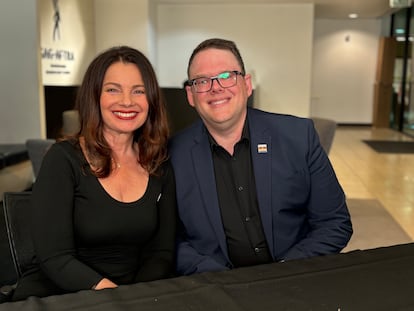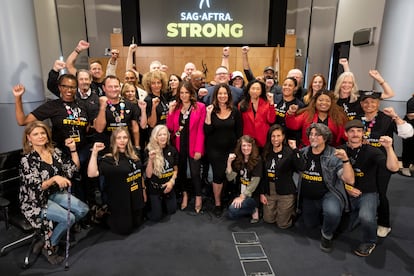Fran Drescher, SAG-AFTRA president, after 118 days of the actors’ strike: ‘I really worried that I wouldn’t live through it’
The actress, famous for her role in the 1990s series ‘The Nanny’, has become the face of the performers’ union during the four-month stoppage


Fran Drescher is ecstatic. She fields calls, attends to radio talk shows and interviews and signs posters bearing the acronym of the union she presides, The Screen Actors Guild-American Federation of Television and Radio Artists (SAG-AFTRA). After four months of struggle, the actress, who starred in the 1990s series The Nanny, has achieved her main objective: an agreement that she considers fair for the 160,000 members of the union she leads. In July, Drescher stood before the studios and asked them for more — much more — and despite the curves in the road she finalized an agreement in excess of $1 billion in benefits. She announced the details of the deal at SAG-AFTRA headquarters last Friday, and, in no hurry to leave, sat down to chat with EL PAÍS for an interview carried out together with the EFE news agency, in which adrenaline won out over fatigue.
The meeting was held in a room on the ground floor of the union’s imposing building, where Drescher was joined by Duncan Crabtree-Ireland, national director of the union and chief negotiator. Asked to define in one word how they feel after 118 days of strike action, Crabtree-Ireland responds: “Very excited.” Drescher, known for her eloquence, employs a few more: “Tired, relieved, and euphoric.”
The two acknowledge that their emotion is above all for the people who “put a lot on the line during the 118-day strike to get us here.” “I’m really proud that the deal I think completely justifies the sacrifices that have to be made to get there. And when we look back on this deal in five or 10 years from now, we’re going to say this was the moment when we established the kind of protections in AI and in a number of other areas as well that our members and other people in the industry really needed,” Crabtree-Ireland says. Drescher adds that the “weights of responsibility of the people that were on strike and the auxiliary businesses that were suffering because of the strike.” generated an enormous amount of stress.
“The state of California alone lost $6 billion in business, so I felt like this had to be worth it,” says the SAG-AFTRA president. “We had to make it worth it or we were going to be it. In the end, there was really no option there but to be successful.” And they were: an agreement worth more than $1 billion with improved salaries, healthcare and pension plans, and progress in protecting artists from the effects of advances in artificial intelligence technology.
The state of California alone lost $6 billion in business, so I felt like this had to be worth itSAG-AFTRA president Fran Drescher
“I’d never really been in an environment where there was so much anger directed at me by male energy,” acknowledges Drescher, 65, who is no stranger to hostile environments: she created, wrote, produced and starred in The Nanny, a series like few others in the 1990s, where she played almost a parody of herself. The show tells the story of a charismatic Jewish girl from the Bronx who studies an esthetics course as almost her only way out, but overnight finds herself working as a nanny for a wealthy family and (spoiler, a quarter of a century later) falls in love with and marries the father. The series (which she created with her then-husband and now her best friend, after they separated in 1996 and he told her he was gay) gave her a fame she has never disowned, made her a fortune and put her in situations of power that have helped her deal with the current situation. Even so, it has not been an easy process.
“It was really hard on my body. And so as time went on, I was actually coming in less and less and doing the zooms because the only way I could go from my negotiating room into the AMPTP [Alliance of Motion Picture and Television Producers, which groups together the studios] negotiating room was to spend as much time with my dog in my bathrobe,” she acknowledges. “I had to keep my world very small. I rarely socialized. Only the people that were absolutely very close to me, that I felt very supported by, were the ones that I let in, and they understood that I was profoundly tired. All of my energy was directed towards this. Leading a group of this size with so much at stake took everything out of me. I really worried that I wouldn’t live through it.”
Crabtree-Ireland says it was important for him to have Drescher by his side. “Fran and I talked almost every day throughout this entire process, and I think for me that was very helpful because it gave us a chance to just make sure we were on the same page and figure out how to support each other,” he says. “And on a personal level, I just felt a great responsibility for making sure that our members knew that as their chief negotiator, but not an actor, we were all in on the strike alongside them.”
Drescher came from an non-artistic background, with a saleswoman mother and a naval engineer father, a systems analyst who, as she herself has stated on occasion, helped her to observe and manage her vision of the world in a different way. In her “provincial town,” as she calls it, of Flushing, New York, she learned what a union was through the many electricians’ strikes. And that came to be reflected in her series years later, and now in real life. Her position at SAG-AFTRA is unsalaried, and she recently won re-election for another two-year term as president. “So I’m coming from a place where the fact that I’m leading this union for no pay and it’s taken such a toll on me and taken me out of my own career, it’s not a surprise really because I’ve always leveraged who I am and my fame for the greater good.”
I just felt a great responsibility for making sure that our members knew that as their chief negotiator, but not an actor, we were all in on the strike alongside them.Duncan Crabtree-Ireland, national director of SAG-AFTRA
“I couldn’t have cancer without turning it into a health movement,” she says of the tumor that was detected in her uterus when she was 42. After a harrowing pilgrimage seeking to alleviate her pain, the only solution was an urgent hysterectomy. She wrote a book about the experience and created a foundation. “I went to Washington to make a law,” she points out. “I went to the mat for the LGBTQ community way before my husband came out. I feel like I have an ability to fight for those that are being marginalized, and I’ve always been that way. So when I was asked to run for president, I thought to myself, everything that I’ve done maybe was for this one defining moment. And that was before I realized that we were going to go on strike. But I knew that I could help this union realize its full potential, that people would go out of their way with the right leadership and come together,” she says.

As an actress, Drescher knows that image is all-important. On July 14, she appeared before her colleagues and the world circumspectly, wearing a serious expression, in sports clothes and a SAG-AFTRA t-shirt. With a four-decade career under her belt, she knew exactly what she was doing. Just as she did on November 10 when she appeared triumphant, smiling, perfectly made up, without fanfare, and wearing a discreet black dress. She was coming out of mourning for the loss of jobs, wages, and even homes among her union members, who were staring down the barrel for 118 days until a fair agreement was reached.
That projection of herself, the turnaround she has managed to achieve over these months of strike, she also achieved with the actors. “I think that the public appreciates that because they may have had a misconception that we’re kind of these rich liberals that are not connected to the real world. And in fact, now they know that 86% of our members can’t even make a $26,474 threshold to meet their health insurance. That the majority of the performers are journeyman performers just living a middle-class life to put food on the table, clothes on their children’s back, and pay rent. And that we have a very large population of members who are part of the background community and they are our lowest paid workers, but essential to every single production,” she says. In fact, extras received the biggest pay raise from the deal: 11%, applied from the get-go, 4% more in July 2024, and 3.5% in July 2025. “So I think that the American public has gotten to know us through a different lens,” Drescher adds.
“I like to quote Frederick Douglass,” she says in reference to the 19th-century American orator, activist, and abolitionist, “because he knew better than anyone that power concedes nothing without demand. It never has and it never will. So in that regard, I’m hoping that this is the beginning of a new sensibility for industry and worker relationships.” So has SAG-AFTRA buried the hatchet with the powerful movie studios with which it has spent four months at loggerheads? “Our job is to say you treat our members with respect. You treat our members fairly, you pay them properly, you protect their image, all of the things that they’ve committed to in this contract. And so, yes, we’re on good terms with them. And we will also fully enforce every aspect of this agreement and make sure that all of those commitments are lived up to,” says Crabtree-Ireland.
Sign up for our weekly newsletter to get more English-language news coverage from EL PAÍS USA Edition
Tu suscripción se está usando en otro dispositivo
¿Quieres añadir otro usuario a tu suscripción?
Si continúas leyendo en este dispositivo, no se podrá leer en el otro.
FlechaTu suscripción se está usando en otro dispositivo y solo puedes acceder a EL PAÍS desde un dispositivo a la vez.
Si quieres compartir tu cuenta, cambia tu suscripción a la modalidad Premium, así podrás añadir otro usuario. Cada uno accederá con su propia cuenta de email, lo que os permitirá personalizar vuestra experiencia en EL PAÍS.
¿Tienes una suscripción de empresa? Accede aquí para contratar más cuentas.
En el caso de no saber quién está usando tu cuenta, te recomendamos cambiar tu contraseña aquí.
Si decides continuar compartiendo tu cuenta, este mensaje se mostrará en tu dispositivo y en el de la otra persona que está usando tu cuenta de forma indefinida, afectando a tu experiencia de lectura. Puedes consultar aquí los términos y condiciones de la suscripción digital.








































